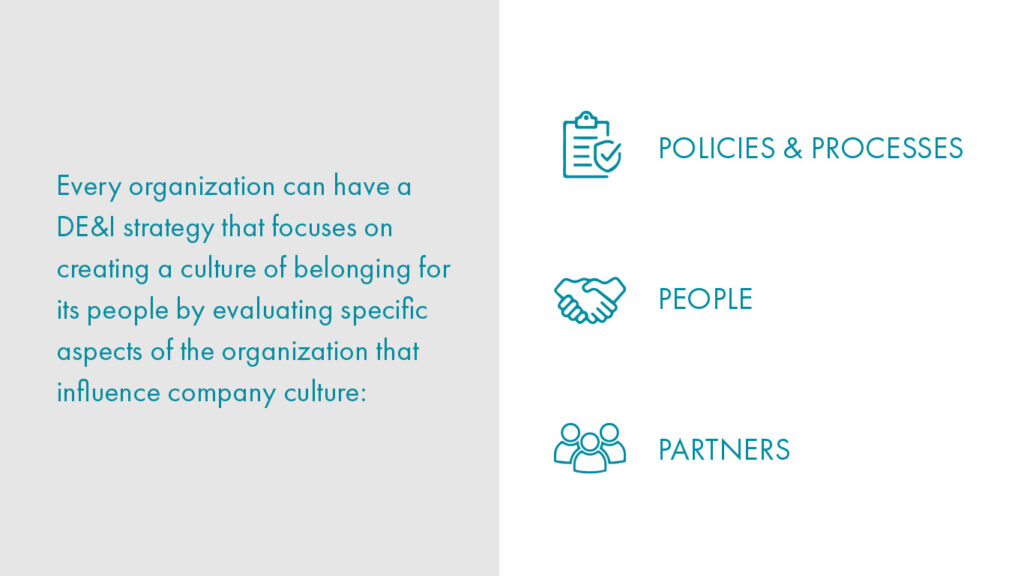Why DE&I Strategies Affect Corporate Value
For many companies, the wide reach of the BLM movement and socioeconomic effects of COVID-19 have served as an impetus to focus on their DE&I strategies (or in many cases lack thereof). Today, employees have begun to expect more from their jobs and employers, specifically with respect to DE&I (diversity, equity, and inclusion). A heightened sense of loss and injustice, on many fronts, has uncovered a desire for people to work within organizations that authentically value their identities and the unique life experiences that they, and others, bring to the table. While creating an organization that is diverse and equitable does not happen overnight; a well-designed DE&I strategy is critical for companies in every industry to survive and thrive in today’s society.
With younger generations of the workforce holding higher expectations for employee treatment, organizations will lose talent if there is a lack of deliberate focus on company culture and DE&I. This becomes even more true as younger generations progress within companies and enter positions of influence.
Retention, which is connected to the same policies and processes that influence talent acquisition, can be maintained or even increased through the adoption of effective and authentic DE&I practices creating a sense of belonging at work. According to HBR, a sense of social belonging at work can lead to a 50% drop in employee turnover risk as well as a 56% increase in job performance. With a sense of belonging at work, employees from underrepresented communities are more likely to feel like their ideas will be heard. They in turn will feel more comfortable soliciting ideas from their community members, which will lead to a larger pipeline of creativity and innovation that organizations can leverage.
DE&I Strategies
These positive shifts in company culture, derived from strong DE&I strategies and policies, lead to financial savings for organizations in the long run. According to HBR, for a 10,000 person organization, a sense of social belonging led to a 75% reduction in sick days and ultimately led to an annual savings of $52 million.
Policies & Processes
Leaders in organizations must take an honest look at the policies and processes that help create the backbone of organizations. Are these policies and processes creating an equitable space to work in? Do these policies truly have the support of organizational leaders and are they enforced? It is imperative that these policies and processes are evaluated with a fresh view and understanding of DE&I. Many organizations do not have the ability to objectively provide their own audit, in which case it is beneficial for the organization to hire a third-party with DE&I expertise to provide this service. This audit should also evaluate the language of the policies to ensure that it is current and connotes the intention of inclusion behind these policies and understanding of societal impacts that DE&I plays on individuals. Policies should feel inspiring and galvanizing, not punitive.
People
People play a critical role in the culture of an organization because they represent the clearest expression of an organization’s culture. Organizations should consider broad questions when thinking about the intersection of DE&I and its people, while also being willing to dive deep into the why of an organization’s current state. Is the workforce diverse? If it is not, is there an attempt to change this? Why has the workforce not been diversified previously? Do all employees feel included or valued? Do employees feel respected by the folks they interact with? Do leaders promote a culture of psychological safety for sharing of ideas or authentic self-expression?
Partners
When it comes to creating and continuing an inclusive and equitable culture, influences on an organization’s culture are not limited to internal policies and people. An organization’s external partners can have a large impact on an organization’s culture and the extent to which an organization’s employees feel that sense of belonging and value. If an organization creates an inclusive and safe culture, do they partner with other organizations that do not have inclusive or safe cultures? If they do partner with organizations with extremely different cultures with regards to DE&I, how do they protect their people and the inclusive culture that they have cultivated? If an employee that interacts with these external partners does not feel protected by the organization that employs them, they will have a different view of the organization’s culture that may not meet their expectations of belonging or respect.
As we have discussed, DE&I strategies have an impact on an organization’s bottom line and long-term growth prospects. When valuing companies, it is important to examine current DE&I strategy and correlating financial implications during HR diligence.
Subscribe to Clarkston's Insights





